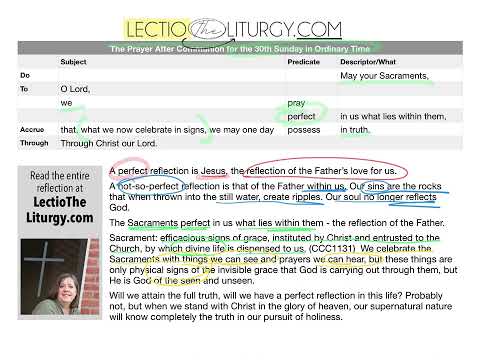Prayer After Communion 30th Sunday of Ordinary Time
This week we Lectio the Liturgy with the Prayer After Communion for the 30th Week of Ordinary Time.
May your Sacraments, O Lord, we pray, perfect in us what lies within them, that what we now celebrate in signs we may one day possess in truth. Through Christ our Lord.
At this time of year a couple years ago, I was driving home and went past an acreage that had a large pond. On the pond, there was a young man in a boat fishing, and the trees behind him, on that side of the pond were at their peak for fall colors. The pond was perfectly smooth, actually, it was a perfect mirror image of the fisherman, the trees, and the sky. I was so struck by the beauty of the reflection, that I was miles down the road before I realized that I should have stopped to take a picture.
There is another reflection that is even more perfect than the one I saw on that perfect fall day, except this reflection is unseen. It is Jesus. Jesus is the reflection of the Father's love for us.
There is also a reflection that is not so perfect. It is the reflection of the Father that is within us. At our baptism, we received the image of Christ, but it has not yet come to full maturity, nor is it perfect. Our sins are like rocks tossed on that pond, creating ripples that distort the image of God in us. Yet consider this, when we receive the Eucharist, when we celebrate the Sacrament of Holy Communion, the perfect presence of Christ comes into the imperfect image of Christ to bring us to his perfection. The perfect image of God that is contained in the Sacraments, perfects us.
Sacraments are defined as efficacious signs of grace, instituted by Christ and entrusted to the Church, by which divine life is dispensed to us. (CCC1131) We celebrate the Sacraments with things we can see and prayers we can hear, but these things are only physical signs of the invisible grace that God is carrying out through them.
Jesus showed us an example of the seen and unseen in Luke Chapter 5. Because the house where Jesus was teaching was so full of people, the friends of a paralyzed man lowered him through the roof. Jesus told the man that his sins were forgiven. When questioned by the scribes and Pharisees, Jesus instructs the man to rise up and walk home. Jesus used the sign that was seen in the natural word, the man's healing, to show them his power over the unseen, the supernatural world.
I sometimes try to imagine what our lives and our worship look like on the supernatural side. When God sees us at prayer or when we receive Holy Communion, what does God see? Does He see more of Jesus than of me? I hope so, I guess that's why perfecting the spiritual life takes perseverance. It's why we never give up because it's not just our need to rely on Christ, it is our innate desire for something greater than the world, something that can only be satisfied in Christ.
Ask yourself this, "Why do I go to Mass?" Begin your answer with the word "because" and then respond to yourself with another question that begins with "why." Carry on your conversation with yourself until your last "because."
Perhaps your conversation might begin like this: I go to Mass because I love the Eucharist. Why do I love the Eucharist? Because I want to be near Jesus. Why do I want to be near Jesus? Because ___________ (fill in your blank).
Your last "because" should have you considering your fear of the Lord, or your desire to serve Him out of love, and you might even see in yourself the desire to be the perfect reflection of God.
Will we attain this truth in its maturity in this life? Probably not, but when we stand with Christ in the glory of heaven, our supernatural nature will know completely, the truth in our pursuit of holiness.
Thanks for praying with me,
Julie
